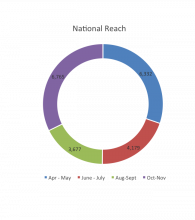Thousands reached through community health engagement in Sierra Leone
New data released today by the Ministry of Health and Sanitation and WHO shows that community engagement efforts reached more than 20,950 households over seven months in 2016, approximately 117,000* people, through community meetings, events, door to door visits and vibrant peer support groups.
Since the Ebola outbreak, the Ministry of Health and Sanitation supported by WHO has prioritized community engagement as a major instrument in the fight to improve health outcomes in Sierra Leone. This includes support for communities to prevent, detect and manage diseases, but also substantive drives to improve child and maternal health. In particular, engagement efforts have focused on promoting delivery at health facilities and antenatal care; immunization uptake; disease surveillance and response; good nutrition, and trust and use of clinics for diagnosis and treatment.
From April to November 2016, 14,800 pregnant women were reached with messages and information on antenatal care and institutional deliveries, both critical interventions towards reducing Sierra Leone’s high numbers of maternal and infant deaths, and 8,000 mothers participated in innovative Mothers’ Support Clubs. These clubs have mobilized ‘Lead Mothers’ to monitor children for malnourishment and stunting and engaged them as peer educators on nutrition.
School health clubs have also rallied young people to talk to their peers about issues that affect their health, from STIs to disease prevention and NCDs, while husbands, domestic partners and community leadership have been engaged as champions and supporters of activities towards maternal and child health and disease prevention and response.
Sandra Miatta Sesay says that these campaigns have made a remarkable difference for public health in her community of Kpapei, a rural farming village in Moyamba District. She is a Lead Mother in a Mother’s Support Group where a large group of women have now been trained in nutrition.
“We talk to pregnant women about what to eat; we talk to mothers about what and when to feed the children, and we talk about breastfeeding for the first six months.”
She adds that the process has enabled women to take charge of their health and that of their family. “In the past some people were not really understanding the importance of breastfeeding and they used to give the children water in the first six months which made them get sick. Today people are really practicing exclusive breastfeeding and our children are doing very well and are strong.”
With support from the Ministry and other health partners, experiences like these show that knowledge, education and community engagement have a very vital role to play in improving health outcomes in Sierra Leone and tackling some of the country’s most pressing health challenges.
Download the data here.
*Based on an average household size of 5.6 (2015 Housing and Population Census)




